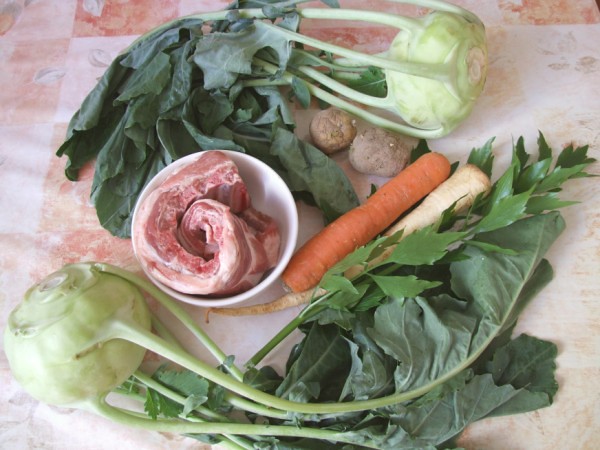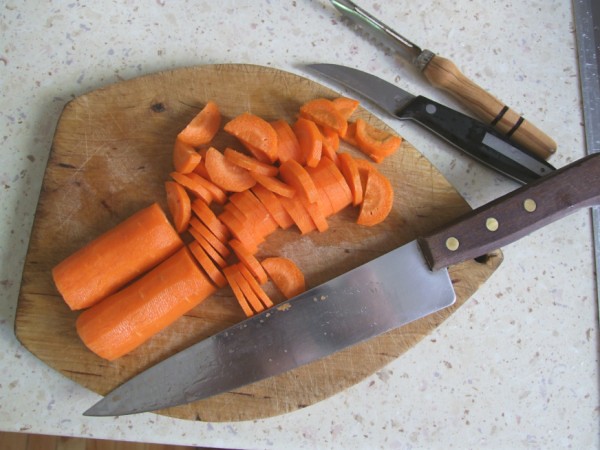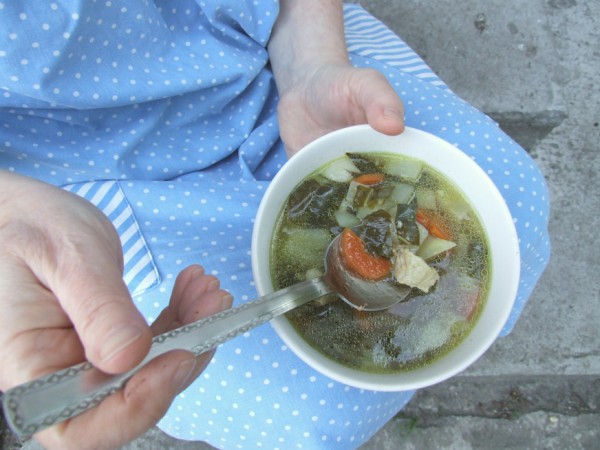Od pewnego czasu spędzam sporo czasu na gotowaniu zup. Zupy te są oczywiście różne, jest natomiast wśród nich taka, której być może (o zgrozo!) nie znacie, ponieważ jest to zupa typowa dla Górnego Śląska – oberiba, czyli zupa z kalarepy. A robi się ją tak:
I’ve been spending quite a lot of my time recently on making soup. Of course it’s not just one kind of soup – the Polish cuisine abounds in soup recipes, but there is one kind of soup that I make a lot and there’s high probability you’ve never had it. Kohlrabi soup is a popular traditional dish in Upper Silesia and here’s how to make it:
Po śniadaniu zarzucamy na ramię płócienną torbę i ruszamy na targ po marchewkę, pietruszkę, kawałek mięsa (Dziadek mówi: „oberiba musi być na żeberkach, Babcia zawsze robiła na żeberkach”, więc kupujemy żeberka, byle nie za tłuste – powinny mieć więcej mięsa), oraz oczywiście rzeczoną kalarepę. Kalarepy kupujemy dwie – co ważne, kupujemy głowy z liśćmi.
After breakfast we take our canvas bag and go to the market to buy some carrot, parsley, a piece of meat (Grandpa says, “kohlrabi soup must be made on ribs, Grandma always made it on ribs,” so it’s ribs we buy, only more meaty than fat), and of course we buy two whole kohlrabis: the heads with the leaves.
Podczas gdy my miło gawędzimy na targu z panią Asią, nasz brat zmywa po śniadaniu, więc kiedy przychodzimy w końcu do domu, możemy zaraz brać się do roboty. Przebieramy się w podomną sukienkę, zawiązujemy fartuch i wyciągamy nasze zakupy z torby. Dokładamy dwa małe ziemniaki (albo jednego dużego oczywiście) oraz prosimy brata, żeby, skoro i tak siedzi na dworze, przyniósł nam gałązkę lubczyku.
While we are at the market, chatting with Mrs Asia, our brother washes the dishes, so that when we’re back home, we can get down to cooking directly. We change into our at-home dress, we tie the apron around our waist and we take our shopping out of the bag. We only need two small potatoes (or a big one of course) more, and we ask our brother, as he’s outside anyway, to fetch us a spray of lovage.
I’ve been spending quite a lot of my time recently on making soup. Of course it’s not just one kind of soup – the Polish cuisine abounds in soup recipes, but there is one kind of soup that I make a lot and there’s high probability you’ve never had it. Kohlrabi soup is a popular traditional dish in Upper Silesia and here’s how to make it:
Po śniadaniu zarzucamy na ramię płócienną torbę i ruszamy na targ po marchewkę, pietruszkę, kawałek mięsa (Dziadek mówi: „oberiba musi być na żeberkach, Babcia zawsze robiła na żeberkach”, więc kupujemy żeberka, byle nie za tłuste – powinny mieć więcej mięsa), oraz oczywiście rzeczoną kalarepę. Kalarepy kupujemy dwie – co ważne, kupujemy głowy z liśćmi.
After breakfast we take our canvas bag and go to the market to buy some carrot, parsley, a piece of meat (Grandpa says, “kohlrabi soup must be made on ribs, Grandma always made it on ribs,” so it’s ribs we buy, only more meaty than fat), and of course we buy two whole kohlrabis: the heads with the leaves.
Podczas gdy my miło gawędzimy na targu z panią Asią, nasz brat zmywa po śniadaniu, więc kiedy przychodzimy w końcu do domu, możemy zaraz brać się do roboty. Przebieramy się w podomną sukienkę, zawiązujemy fartuch i wyciągamy nasze zakupy z torby. Dokładamy dwa małe ziemniaki (albo jednego dużego oczywiście) oraz prosimy brata, żeby, skoro i tak siedzi na dworze, przyniósł nam gałązkę lubczyku.
While we are at the market, chatting with Mrs Asia, our brother washes the dishes, so that when we’re back home, we can get down to cooking directly. We change into our at-home dress, we tie the apron around our waist and we take our shopping out of the bag. We only need two small potatoes (or a big one of course) more, and we ask our brother, as he’s outside anyway, to fetch us a spray of lovage.
Wyjmujemy garnek na zupę i wkładamy do niego opłukane żeberka oraz marchewkę pokrojoną na kawałki. Ja lubię marchewkę pokrojoną tak, jak widać na zdjęciu, ale o ile dobrze pamiętam, Babcia Krysia kroiła ją chyba w słupki. Na tym etapie zaczynamy mieć wątpliwości co do pietruszki. Konsultujemy się z niedawno kupioną „Śląską kucharką doskonałą” (która wyklucza nie tylko pietruszkę, ale także marchewkę, a za to proponuje kminek, cebulę i zasmażkę – nie, to nie taką oberibę robiła Babcia); konsultujemy się z babciną książką „Nowa kuchnia śląska” (ta z kolei obrazoburczo pomija zupę z kalarepy, a proponuje zupę-krem z kalarepki); prychamy z pogardą i zagłębiamy się w otchłanie naszej pamięci, z których wyłaniamy się pewni, że żadnej pietruszki tam nie było. Opłukujemy więc tylko gałązkę lubczyku, zalewamy wszystko wodą, solimy i stawiamy na ogniu.
We take the soup pot out and put the ribs inside. We dice the carrot (I like it most the way it’s in the photo but if I remember correctly, Grandma Krysia used to roughly julienne it). At this stage we begin to have misgivings about the parsley. We consult a couple of cooking books; the first one disregards carrot and parsley, proposing caraway and onion instead, but that’s not the way Grandma used to do it; the other disregards kohlrabi soup completely, so we in turn disregard it and turn to our memories for help. Our memories are clear on this point: no parsley, so we just wash the lovage, pour water into the pot, salt it and start to boil it.
We take the soup pot out and put the ribs inside. We dice the carrot (I like it most the way it’s in the photo but if I remember correctly, Grandma Krysia used to roughly julienne it). At this stage we begin to have misgivings about the parsley. We consult a couple of cooking books; the first one disregards carrot and parsley, proposing caraway and onion instead, but that’s not the way Grandma used to do it; the other disregards kohlrabi soup completely, so we in turn disregard it and turn to our memories for help. Our memories are clear on this point: no parsley, so we just wash the lovage, pour water into the pot, salt it and start to boil it.
Podczas gdy temperatura w garnku rośnie, idziemy pościelać łóżko, nastawić pralkę, a z wczorajszym wieczornym praniem wybieramy się na strych, skąd znosimy suche już wczorajsze ranne pranie. Tymczasem w garnku zaraz zacznie wrzeć, więc obieramy ziemniaki i wrzucamy, pokrojone na kawałeczki. „A gdzie kalarepa?”, zapyta ktoś. Ano tu. Trzeba teraz odciąć liście i odłożyć na chwilę na bok, a głowy obrać, opłukać i pokroić w słupki.
While the temperature in the pot is rising, we go to make our bed, turn on the washing machine, take yesterday’s evening laundry up and take yesterday’s morning laundry, already dry, down. Meanwhile the soup is about to boil, so we peel the potatoes, cut them in fairly small pieces and throw them in the pot. “Where’s the kohlrabi?” you might ask. Right here. All you need to do is cut the leaves off, peel the heads, wash them and cut into sticks.
Może się tak zdarzyć, że przy tej czynności zaskoczy nas telefon, który sprawi, że będziemy musieli w pośpiechu wyjść z domu (wyłączając uprzednio gaz pod zupą, ale zostawiając pralkę, niech sobie pierze). Może tak być i wtedy nie zrobimy zdjęcia ani pokrojonej kalarepie, ani temu, co się zaraz będzie działo z liśćmi. Ale możemy mimo to opisać to, co pod naszą nieobecność się stanie, bo widzieliśmy to już nie raz. Otóż wróci Mama i dokończy krojenia kalarepy. Ja wolę słupki, Mama woli kostkę – zaraz zobaczycie, kto miał ostatnie słowo. Pokrojoną kalarepę wrzuci Mama do ponownie gotującej się zupy, a ugotowane już mięso wyjmie. Wyjmie też lubczyk, żeby nie sprawiał kłopotów.
It might happen that at precisely this stage you’ll be surprised by a phone call which will result in your having to leave home at once (having of course shut off the gas first, leaving the washing machine as it is). This might happen, and then we wouldn’t be able to take photos of how the kohlrabi is cut or what happens later to the leaves. But we can describe what will happen while we’re away, as we’ve seen it dozens of times. What will happen is: Mom will come back home and finish dicing the kohlrabi heads. I prefer it in sticks, she prefers it in cubes – you’ll see in a moment who had the final word. Once it’s diced, she will throw it into the soup (boiling again), and take out the meat which will already be cooked. She will also take out the lovage so it doesn’t interfere.
Później Mama odetnie łodyżki liściom kalarepy, a to, co zostało, sparzy wrzątkiem, pokroi i wrzuci do zupy. Pogotuje jeszcze przez jakieś 20 minut, a na koniec doda jeszcze to ugotowane mięso, również pokrojone, i doprawi przy pomocy Maggi. Dzięki temu, kiedy wrócimy półżywi po pięciu godzinach i uciążliwej podróży autobusem, oberiba będzie już gotowa.
Then Mom will cut the stems off the kohlrabi leaves and blanche what is left, cut it and also throw into the pot. She’ll let it boil some 20 minutes more, at the end adding the cooked meat which she would also cut into smaller pieces first, and then she’ll just season it with Maggi. And so, when at last you come back home five hours later, half-dead after a rather exhausting bus journey, the soup will be ready.
While the temperature in the pot is rising, we go to make our bed, turn on the washing machine, take yesterday’s evening laundry up and take yesterday’s morning laundry, already dry, down. Meanwhile the soup is about to boil, so we peel the potatoes, cut them in fairly small pieces and throw them in the pot. “Where’s the kohlrabi?” you might ask. Right here. All you need to do is cut the leaves off, peel the heads, wash them and cut into sticks.
Może się tak zdarzyć, że przy tej czynności zaskoczy nas telefon, który sprawi, że będziemy musieli w pośpiechu wyjść z domu (wyłączając uprzednio gaz pod zupą, ale zostawiając pralkę, niech sobie pierze). Może tak być i wtedy nie zrobimy zdjęcia ani pokrojonej kalarepie, ani temu, co się zaraz będzie działo z liśćmi. Ale możemy mimo to opisać to, co pod naszą nieobecność się stanie, bo widzieliśmy to już nie raz. Otóż wróci Mama i dokończy krojenia kalarepy. Ja wolę słupki, Mama woli kostkę – zaraz zobaczycie, kto miał ostatnie słowo. Pokrojoną kalarepę wrzuci Mama do ponownie gotującej się zupy, a ugotowane już mięso wyjmie. Wyjmie też lubczyk, żeby nie sprawiał kłopotów.
It might happen that at precisely this stage you’ll be surprised by a phone call which will result in your having to leave home at once (having of course shut off the gas first, leaving the washing machine as it is). This might happen, and then we wouldn’t be able to take photos of how the kohlrabi is cut or what happens later to the leaves. But we can describe what will happen while we’re away, as we’ve seen it dozens of times. What will happen is: Mom will come back home and finish dicing the kohlrabi heads. I prefer it in sticks, she prefers it in cubes – you’ll see in a moment who had the final word. Once it’s diced, she will throw it into the soup (boiling again), and take out the meat which will already be cooked. She will also take out the lovage so it doesn’t interfere.
Później Mama odetnie łodyżki liściom kalarepy, a to, co zostało, sparzy wrzątkiem, pokroi i wrzuci do zupy. Pogotuje jeszcze przez jakieś 20 minut, a na koniec doda jeszcze to ugotowane mięso, również pokrojone, i doprawi przy pomocy Maggi. Dzięki temu, kiedy wrócimy półżywi po pięciu godzinach i uciążliwej podróży autobusem, oberiba będzie już gotowa.
Then Mom will cut the stems off the kohlrabi leaves and blanche what is left, cut it and also throw into the pot. She’ll let it boil some 20 minutes more, at the end adding the cooked meat which she would also cut into smaller pieces first, and then she’ll just season it with Maggi. And so, when at last you come back home five hours later, half-dead after a rather exhausting bus journey, the soup will be ready.
Najlepszą zupę z kalarepy robiła oczywiście Babcia Krysia, czyli mama mojej Mamy. Mam pewne podejrzenia, że dodawała do niej zasmażki i to dlatego nie udaje nam się z Mamą nigdy uzyskać takiego smaku. Moja pierwsza zupa z kalarepy była nieudana, dopiero Dziadek przeanalizował sprawę i rzucił parę cennych uwag (typu wspomniane żeberka) i teraz już jest znacznie bliższa ideału.
Of course the best kohlrabi soup ever was the one my maternal Grandma Krysia made. I suspect she added roux and that’s why Mom and I are never able to emulate that taste. My first kohlrabi soup was a failure, but my Grandpa kindly helped with a few precious observations (like the one about the ribs) and now it’s much closer to the ideal.
***
A jeśli ktoś ma ochotę wylosować książkę, której akcja rozgrywa się w przedwojennych Katowicach, to ma czas do północy w piątek, żeby zostawić pod tym postem komentarz i napisać w nim, co dobrego je się w jego okolicy.
Of course the best kohlrabi soup ever was the one my maternal Grandma Krysia made. I suspect she added roux and that’s why Mom and I are never able to emulate that taste. My first kohlrabi soup was a failure, but my Grandpa kindly helped with a few precious observations (like the one about the ribs) and now it’s much closer to the ideal.
***
A jeśli ktoś ma ochotę wylosować książkę, której akcja rozgrywa się w przedwojennych Katowicach, to ma czas do północy w piątek, żeby zostawić pod tym postem komentarz i napisać w nim, co dobrego je się w jego okolicy.









